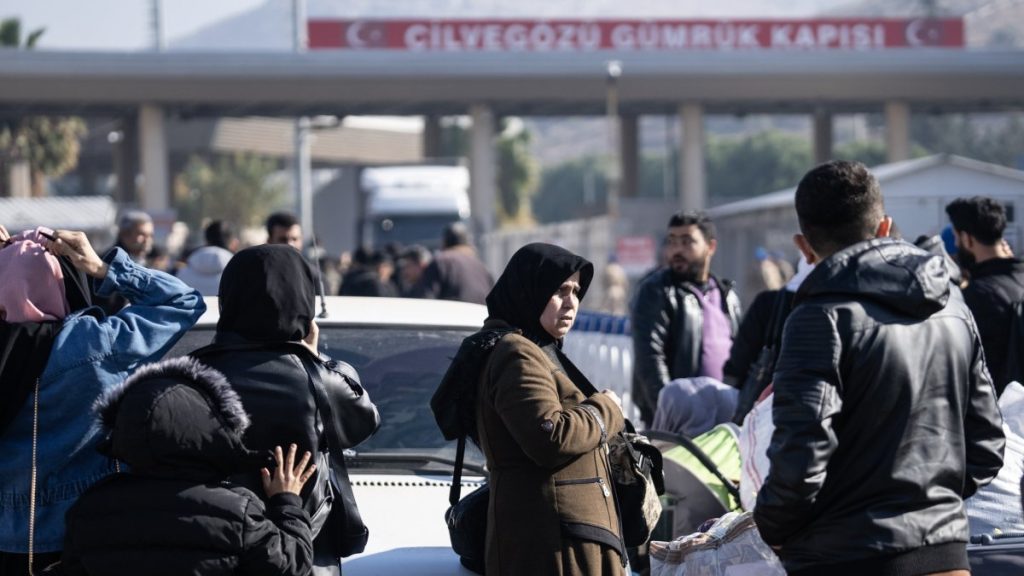Syrian refugees continued their journey to their homeland on Tuesday from Türkiye in the aftermath of the fall of the oppressive Assad regime. This time, they had another passage: Yayladağı, a border crossing reopened 13 years later.
President Recep Tayyip Erdoğan announced on Monday after a Cabinet meeting that the Yayladağı crossing in the southern province of Hatay would be opened for returns to prevent crowding in Cilvegözü, another border crossing in the province. The Kumlu and Zeytindalı crossings in Hatay were also open.
In the early hours of Tuesday, the Interior Ministry’s migration department set up a mobile unit at the crossing to streamline the return of Syrians, who, for years, lived in temporary protection status in Türkiye.
Cilvegözü, however, was more popular for those seeking to return home. Ahmed Meshan was among them. Arriving at the border with his 8-year-old daughter Aya, Meshan told Demirören News Agency (DHA) on Tuesday that he would reunite with his wife and three other children who remained in Syria. “Assad is gone and the war is over. I am happy to return. Turks here treated me like a brother. I want to visit them again one day again. May Allah bless the Turkish people and President Erdoğan,” he said, before crossing into Syria to travel to his hometown Hama.
Refugees are required to hand over their residence records to local migration authorities in the provinces they live before returning home. After checking whether they have criminal records and outstanding debts, authorities hand documents granting them the right to cross into Syria, in return for their refugee IDs.
Mustafa Dervish, a carpenter from Hama who was waiting at the border to go back home, said he settled in Türkiye seven years ago. “My entire family, relatives are in Hama. Türkiye supported us during the civil war. I am grateful to the people of Türkiye for their hospitality,” he said.
Hatay Governor Mustafa Masatlı told reporters on Tuesday that they took all measures so that “our Syrian guests can smoothly cross to the other side.” Masatlı said each “guest” was required to give their fingerprints on their way to Syria.
Hundreds of thousands have died in the Syrian war. More than half the prewar population of 23 million were forced from their homes, with millions fleeing abroad, including across the frontier to Türkiye. Many of those who settled learned Turkish, put their children in local schools and some acquired Turkish nationality, but they remained geographically close to their homeland, hoping they could someday return. Türkiye has become home to millions of Syrians who fled since the civil war erupted and hosted the largest refugee community in the world at one point. According to figures from the Interior Ministry released in October, 11,000 Syrian nationals go back to Syria monthly, while about 219,000 others are believed to have left for Europe overall.
Between 2016 and 2024, a total of 715,000 Syrians returned to their country. The number of those returning since June 1, 2023, reached 160,000.
On Monday evening, Interior Minister Ali Yerlikaya said the number of people returning to Syria almost doubled, noting “the momentum.” He said they also increased the capacity of border crossings to process returnees to “up to 20,000 people daily.” “Developments are very new for many people. The government is still being formed in Syria. We are observing the situation,” the minister said. He said he would hold a news conference soon to explain how they would ensure voluntary and dignified returns.
Erdoğan said on Monday that Türkiye always had a humanitarian perspective on the issue of the Syrian crisis and viewed Syrian people as their brothers and sisters. “We cannot be expected to turn our backs on our neighbors we lived together for centuries, neighbors we share a border of 910 kilometers (565.45 miles). This is a fact that we saw once again as a nation for the past 13 years. When there was a fire in our neighbor’s home, they ran to us,” he said. Erdoğan stated that the population of refugees reached 3.7 million at one point before decreasing to 2.9 million. “We have been ‘ansar’ to them for 13 years,” he said. Türkiye always used this analogy referring to the people of Medina (of modern-day Saudi Arabia) who warmly received Prophet Muhammad and his followers when Muslims faced persecution in the first days of Islam in Mecca. The president said they never complained of the refugee flow and even clashed with the Turkish opposition “which promised to send them away if they won elections.” “As Assad lost, the dirty mindset stoking anti-refugee sentiment also lost,” Erdoğan said.
The president said voluntary, safe, dignified and regular returns would increase as Syria becomes more stable. “I hope longing for their homeland will slowly end for our Syrian brothers and sisters,” he said. The president pledged that they would manage the return process in a way “appropriate for our culture.” “We will not allow anyone to stain this process,” he stated.


